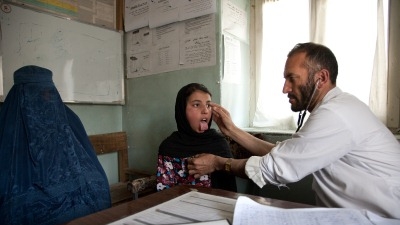World Bank provides new funding to Afghanistan for basic health and hospital services
WASHINGTON, D.C. ─ The World Bank approved today a $100 million grant from the International Development Association (IDA) to help the government of Afghanistan expand the scope, quality, and coverage of basic health and essential hospital services in Afghanistan. The Afghanistan System Enhancement for Health Action in Transition (SEHAT) Project will cover both rural and urban areas in 22 of the country’s 34 provinces. It will also strengthen the national health system and build the capacity of the Ministry of Public Health to effectively perform its stewardship functions at the central and provincial levels.
SEHAT follows two earlier projects financed by the World Bank. With this new financing, the World Bank has provided a total of $335 million since 2003, including support from the Afghanistan Reconstruction Trust Fund (ARTF). This funding would be further supplemented by a proposed ARTF funded grant of $270 million including European Union and government contribution of $30 million.
Over the decade, the number of health facilities in 11 target provinces nearly tripled from 148 to 432. Around 20,000 community health workers — half of them women — were trained and deployed throughout the country, increasing access to family planning and boosting childhood vaccinations. The number of facilities with trained female health workers rose from 25% before the project to 74% today. At the same time, the number of functioning health facilities increased from 496 to more than 2,000. These interventions have produced significant improvement in the coverage of reproductive and child health services, as well as a significant drop in maternal and child mortality.
The above outcomes were possible because of the Basic Package of Health Services (BPHS) and Essential Package of Hospital Services (EPHS) implemented by the Ministry of Public Health with support from international and national NGOs for delivery of health services across the country. SEHAT will expand to 22 provinces and continue to support these services, as well as strengthening the capacity of the ministry through modernizing systems, streamlining organizational structures, building a cadre of skilled and motivated staff and making hospitals more autonomous.
"Investing in human health is vital for the country’s wellbeing and ensuring a healthy and productive society,” said Robert Saum, World Bank country director for Afghanistan. “This new support comes in the midst of Afghanistan’s transition and aims to boost human capital in the country. The current progress gives us optimism that the country can achieve some of the MDG targets at the turn of this decade. I would like to compliment the Ministry of Public Health and its partner agencies and the international community for this remarkable progress.”
Despite recent progress, the country faces significant challenges in the sector. Afghanistan’s infant and under-5 mortality rates are still higher than the average for low-income countries, and child malnutrition rates are among the highest in the world. About 55% of children under 5 suffer from chronic malnutrition, and women and children suffer from high levels of vitamin and mineral deficiencies. Saum noted that “This additional financing will assist the government to address some of these challenges.”
In 2018, through SEHAT, Afghanistan aims to achieve the following outcomes:
- 35% of births attended by skilled health personnel
- 60% of children aged between 12 and 23 months will be vaccinated against five vaccine-preventable diseases
- 40% of pregnant women will have antenatal care coverage
- 50% of pregnant and lactating women would have received counseling on infant and young child feeding
- 15 national hospitals will have full budgetary autonomy
For a decade, the EU, the United States Agency for International Development (USAID) and the World Bank have been supporting health service delivery in Afghanistan, each targeting a specific set of provinces. The World Bank provides financing for 11 provinces through an ongoing project, Strengthening Health Activities for the Rural Poor (SHARP), which will close on Sept. 30, 2013. The EU finances the provision of Basic Package of Health Services (BPHS) and Essential Package of Hospital Services (EPHS) in 10 provinces, and USAID provides financing for the same service packages in the remaining 13 provinces. The SEHAT project will be a platform nation-wide project, which will allow for financing health services in more provinces if additional resources become available.
The World Bank administers the ARTF on behalf of donors. The ARTF is a partnership between the international community and the Afghan government to improve the effectiveness of the reconstruction effort. Since early 2002, a total of 33 donors have contributed over $6 billion to the fund, making ARTF the largest contributor to the Afghan budget -for both operating costs and development programs. ARTF's support for national priority programs, for operating costs of government operations, and for the policy reform agenda is contributing to the achievement of the Afghanistan National Development Strategy goals. The ARTF Management Committee consists of representatives from Ministry of Finance, Asian Development Bank (ADB), Islamic Development Bank (IsDB), United Nations Development Program (UNDP) and the World Bank.
The International Development Association (IDA) is the World Bank's fund for the poorest. Established in 1960, IDA aims to reduce poverty by providing loans (called “credits”) and grants for programs that boost economic growth, reduce inequalities, and improve people’s living conditions.

